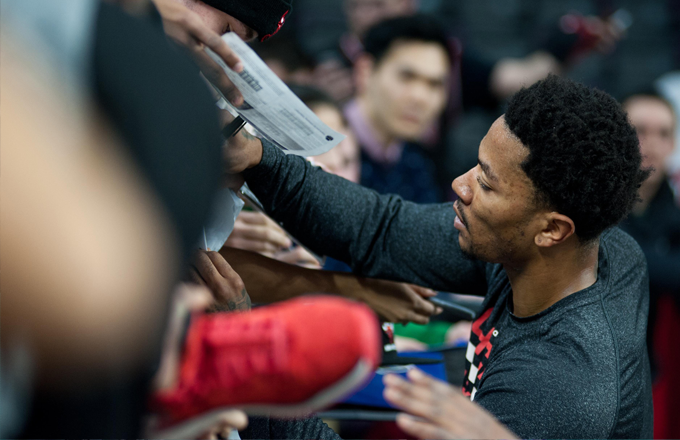
This will sound like it has nothing to do with anything, but bear with me. I remember exactly where I was when the New Jersey Nets traded Stephon Marbury to the Phoenix Suns for Jason Kidd. I was on my bike at Union Square in NYC, and someone texted me with the news. There was a brief conversation about it—me thinking the Nets had made a terrible mistake, whoops—and the evening went on. The discussion would continue the next day. That was back in 2001, when your phone was only a link to people you actually knew, and those people shared information with you when they got it. The world doesn’t work like that anymore.
This is how I found out Derrick Rose tore his meniscus: I read a tweet from Sean Highkin (@highkin):
So, um, Derrick Rose has a tear of the right medial meniscus.
— Sean Highkin (@highkin) February 25, 2015In the time it took me to retweet it (manually, of course, adding the delightfully all-purpose “what”), half the basketball Twitter media had tweeted it themselves. There was no need for anyone to send me a text. I knew. Everyone knew.
The worst part about it, outside of the injury itself, was the sense of resignation. The tone was wrong. Yes, there was crushing disappointment, but it was expected crushing disappointment, a feeling of deja vu brought on because this exact thing had happened before. Of course Derrick Rose suffered a potentially season-ending knee injury. Isn’t that how it goes now? And then there’s all that comes with it: The surgery, the recovery, the return, the working his way back to—wherever he can work his way back to this time. Sometimes the mountain you’ve climbed before is that much harder the second time because you know exactly what to expect. And Rose is 26 now, not 23. Those lost seasons, much as we want them to, don’t just get tagged onto the end. They’re gone.
As we age as fans and we find ourselves suddenly peers with not the players but the coaches, I think we gain a better perspective on athletic mortality. The idea of one’s career being packed into 10 years (if you’re lucky), the idea of being finished with something you’re the best in the world at by 40 (again, if you’re lucky) is completely fucking insane. There is no equivalent. Roger Daltrey may have sang “hope I die before I get old,” but there he is still touring with the Who at 70. It’s no wonder the best professional athletes make hundreds of millions of dollars—maybe it’s not for playing, because they’d do that for free, maybe it’s for the knowledge that one day all too soon they’ll have to stop. Some will do anything to prolong that moment. Others won’t.
1.

Which, at long last, brings me to something resembling a point: What if three knee injuries was one too many? What if Derrick Rose just decided to walk away?
It’s kind of amazing more athletes don’t do it, actually. There’s plenty of precedent—Jim Brown retired from the NFL at 29 way back in 1965—but the overwhelming storyline has always been play until you can’t play anymore, then keep playing for a while after that as long as someone is willing to keep paying you. If one is so fortunate to be blessed with otherworldly talents, it’s almost as if there is an obligation to wring them completely dry whatever the cost. Rose himself doesn’t appear to think this way. He said in an interview that “I’m thinking about after I’m done with basketball, having graduations to go to, having meetings to go to. I don’t want to be in my meetings all sore or be at my son’s graduation all sore just because of something I did in the past.’’ Is that so wrong? Apparently.
Our expectations for professional athletes are completely insane.
Our expectations for professional athletes are completely insane. We want them to remain at their peak forever, then blame them when they use questionable means to do so. We look at their exorbitant salaries, which we feel like we’re somehow paying through tickets or cable bills, and decide they’re somehow our property, that we have some personal stake in their careers. Social media has likely contributed to deepening this feeling, so have fantasy sports. But at its root it’s as old as professional sports itself, the idea that someone could betray their talents, and by doing so betray our trust, betray us. Hey. Sports fan. It’s not about US.
So if Derrick Rose decided that it wasn’t worth it anymore, that any job that required three knee surgeries in four years was a terrible idea in the first place, there’s not anything any of us could do to stop him. He could reach some kind of buyout with the Bulls—like the Bucks did with Larry Sanders—work something out with adidas, and get on with the rest of his life. Which is something he’ll have to do soon regardless. He’s made close to $75 million with the Bulls alone, he should be able to get by.
Will this happen? Probably not. Derrick Rose will most likely be back. A meniscus tear isn’t as serious as the ACL tear that sidelined him for the entire 2012-13 season, and if he chooses to have it removed rather than repaired, he could be back even faster—possibly even in time for the postseason. It’s all a familiar narrative, one we’ve heard before. It’s what we expect. But it’s good to remember that, however invested we feel in it, that Derrick Rose’s future only belongs to him. Whatever it may entail.

